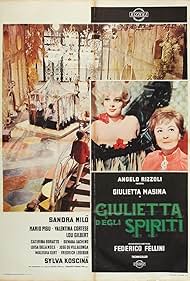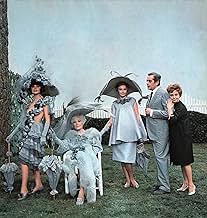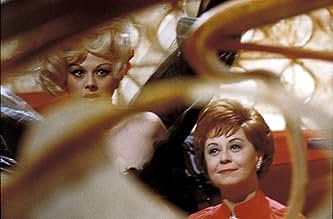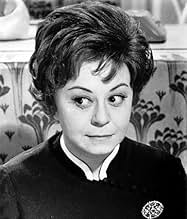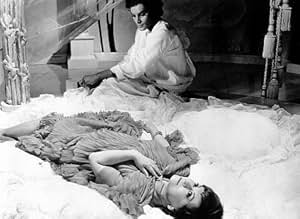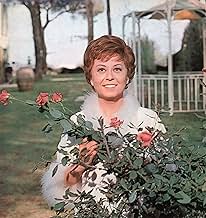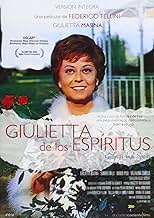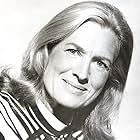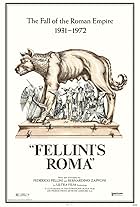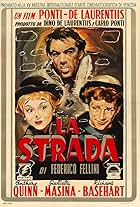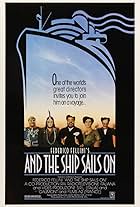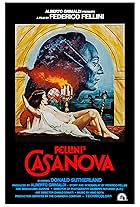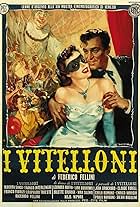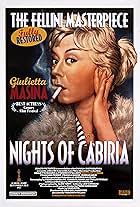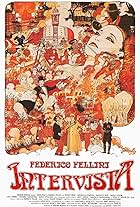CALIFICACIÓN DE IMDb
7.4/10
15 k
TU CALIFICACIÓN
Visiones, recuerdos y misticismo ayudan a una mujer de 40 y tantos a reunir la fuerza necesaria para dejar a su marido infiel.Visiones, recuerdos y misticismo ayudan a una mujer de 40 y tantos a reunir la fuerza necesaria para dejar a su marido infiel.Visiones, recuerdos y misticismo ayudan a una mujer de 40 y tantos a reunir la fuerza necesaria para dejar a su marido infiel.
- Nominado a 2 premios Óscar
- 12 premios ganados y 5 nominaciones en total
José Luis de Vilallonga
- Giorgio's friend
- (as José De Villalonga)
Friedrich von Ledebur
- Headmaster
- (as Fredrich Ledebur)
Milena Vukotic
- Elisabetta, the maid
- (as Milena Vucotic)
- …
George Ardisson
- Dolores' model
- (as Giorgio Ardisson)
Argumento
¿Sabías que…?
- TriviaDirector Federico Fellini claimed he took LSD in preparation for making this film.
- Citas
Giulietta Boldrini: I don't care about the clemency you offer me but the salvation of my soul.
Opinión destacada
I was 15 years old when I stumbled into a cinema and caught my first Fellini film -- Juliet of the Spirits. I was so jazzed, wowed and bedazzled by it, I'm sure I went back a few more times. It led me to other Fellini films and, since, he's become my favorite film director.
Though at age 15, I shouldn't have been able to relate very well with this story of an Italian middle-aged woman and her crumbling psyche (what with her failing marriage, her unsympathetic relatives and her repressive childhood), the movie made me care about this woman and showed me sights on film that I'd never seen before.
Masina (Fellini's wife), in her performance, has nearly everything to do with making Juliet's story meaningful, even to a teenaged boy in California. The character's thoughts flash, unspoken, across her face. Her fear, her
bemusement, her insecurities--all are writ in italics and I had no trouble empathizing with Juliet.
Fellini, though, makes the film an occasion to witness how far the medium can go in bringing alive a person's inner life. The weird and awful power of (subjective) memory, the dream state, the spectres of loneliness, betrayal and Catholic mythology: all these and more overtake the screen, dominate the imagery and play the antagonists to Juliet who, as seen by the other "real" characters in the story, is just a simple, loving housewife and neighbor. Juliet finally has to face her demons and either vanquish them or go mad. By the end of the film, we know most of her demons, where they came from, whom they represent and what they mean. What an accomplishment!
In a clinical setting, Fellini dropped LSD around the time he concocted this film. That may be one reason the movie is so psychedelic. This also was his first feature in color. The music is unforgettable. Costumes should have won the Oscar, but that honor went to "Man for all Seasons".
Incidentally, I've bought and viewed the DVD of this movie. It's quite washed-out and not as good as an available VHS letterboxed version.
I'll always miss Fellini, but am so grateful that he was able to make this film and over a dozen others.
Though at age 15, I shouldn't have been able to relate very well with this story of an Italian middle-aged woman and her crumbling psyche (what with her failing marriage, her unsympathetic relatives and her repressive childhood), the movie made me care about this woman and showed me sights on film that I'd never seen before.
Masina (Fellini's wife), in her performance, has nearly everything to do with making Juliet's story meaningful, even to a teenaged boy in California. The character's thoughts flash, unspoken, across her face. Her fear, her
bemusement, her insecurities--all are writ in italics and I had no trouble empathizing with Juliet.
Fellini, though, makes the film an occasion to witness how far the medium can go in bringing alive a person's inner life. The weird and awful power of (subjective) memory, the dream state, the spectres of loneliness, betrayal and Catholic mythology: all these and more overtake the screen, dominate the imagery and play the antagonists to Juliet who, as seen by the other "real" characters in the story, is just a simple, loving housewife and neighbor. Juliet finally has to face her demons and either vanquish them or go mad. By the end of the film, we know most of her demons, where they came from, whom they represent and what they mean. What an accomplishment!
In a clinical setting, Fellini dropped LSD around the time he concocted this film. That may be one reason the movie is so psychedelic. This also was his first feature in color. The music is unforgettable. Costumes should have won the Oscar, but that honor went to "Man for all Seasons".
Incidentally, I've bought and viewed the DVD of this movie. It's quite washed-out and not as good as an available VHS letterboxed version.
I'll always miss Fellini, but am so grateful that he was able to make this film and over a dozen others.
- cineaste-4
- 14 may 2000
- Enlace permanente
Selecciones populares
Inicia sesión para calificar y agrega a la lista de videos para obtener recomendaciones personalizadas
Detalles
- Fecha de lanzamiento
- Países de origen
- Idiomas
- También se conoce como
- Juliet of the Spirits
- Locaciones de filmación
- Productoras
- Ver más créditos de la compañía en IMDbPro
Taquilla
- Total a nivel mundial
- USD 8,734
- Tiempo de ejecución2 horas 17 minutos
- Mezcla de sonido
- Relación de aspecto
- 1.85 : 1
Contribuir a esta página
Sugiere una edición o agrega el contenido que falta

Principales brechas de datos
By what name was Julieta de los espíritus (1965) officially released in India in English?
Responda